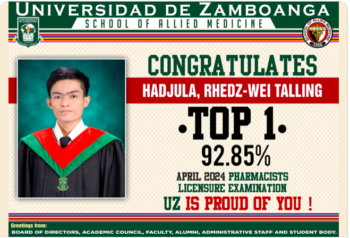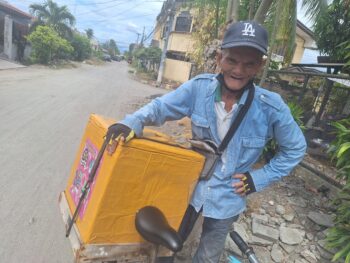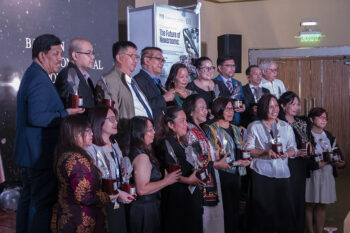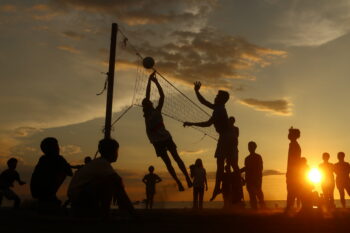Last of six parts: The Need for a Model: Islamic State or Revolutionary Line?
By Rudy Buhay Rodil
[My paper written in typewriter when I was a participant at the Eleventh Annual Seminar Session on Mindanao and Sulu Cultures, Dr. Peter Gowing Memorial Research Center, Marawi City April 15 to May 10, 1985; delivered at the First Assembly of Ranao Development Forum, 18-19 May 1985, Marawi City. Slightly revised.]
ILIGAN CITY (MindaNews / 28 Oct) – The concept of an Islamic state is certainly an attractive one. It brings to mind the ummah in the time of Muhammad (peace be upon him). And theoretically at least, it provides the answer to the Moro (Muslim) aspiration to create a society tailored to the practice of true Islam. But how feasible is it in the Philippines? The Moros (Muslim) constitute the numerical majority in five provinces of Mindanao and Sulu: Maguindanao, Lanao del Sur, Basilan, Sulu, and Tawi-Tawi. This demographic reality alone is already a serious obstacle to feasibility. Are there models elsewhere in the world after which the Moros (Muslims) could pattern their own?
The book entitled The Islamic State by Asghar Ali Engineer, an Islamic scholar of world renown, can provide us with some clues. In Chapter 4 of his book, Engineer capsulizes a review of the history of Islamic statehood in two paragraphs which we quote here in full:
“… the concept of Islamic state changed with the chance in historical conditions. What began as a non-repressive collective organization in the semi-nomadic and tribal conditions of Arabia in the early period of Islam was transformed into a highly repressive feudal state when the conquests shifted the centre of power from the holy cities of Arabia to the heartland of feudalism first in the Roman province of Syria during the Umayyad period and later to Baghdad during the Abbasid period. In the changed historical conditions and with the emergence of new productive forces, the old social composition also underwent profound changes and so did the nature of the state. The elective principle of early caliphate was replaced by hereditary monarchical one and still later sultans, who had captured power by sheer might of arms, came to wield actual political power. Ulama, the theoreticians of Islam, accordingly modified their theories of the Islamic state in order to suit the new realities. Now they made it obligatory for all the faithfuls… to obey anyone who wielded power provided he professed the religion of Islam and enforced Islamic prayer.
“By the beginning of the sixteenth century, almost the entire Arab world came under the domination of the Ottoman empire. Egypt, Syria, Tripoli, Tunis and Algiers in the North and the Yemen on the southern end of Arabian peninsula were incorporated into the empire lorded over by the Ottomans. The Turkish rulers were called sultans and the myth of caliphate which survived through the Mamluke period in Egypt finally vanished. The Ulama once again accepted the new reality and found justification for Ottoman rule. Turkish sovereignty over the Arab provinces ended only during the First World War in 1918 with the help of the British power. It was only during this period that the Muslim people, along with others in the colonial countries, started developing a new sense of nationalism.” (pp.89-90)
Several Muslim thinkers over history, said Asghar Ali, have expounded on the concept of Islamic state but have so far not arrived at a common idea. And this is because, he pointed out, “there is no fixed concept of an Islamic state – much less a divinely ordained one to be treated immutably. The Koran… elucidates a concept of society, not of a state. The theory of Islamic state… changed and conformed more to the concrete situations than any a priori concept. In matters of state the prophet himself … followed the most pragmatic course keeping in view the concrete situation, of course, often supported by revelations, but not always.” (p. 199)
Today, there is a phenomenon in some countries of the Middle East described as “the resurgence of Islam.” But this has acquired serious proportions only in a few countries like Pakistan, Iran, Libya and Saudi Arabia. The principal stress in the doctrine is on Islamic fundamentalism. The fundamentalist among the Moro people seem to derive their inspiration from these countries. There is thus an inclination to use these countries as models. To what extent is not quite clear yet. But let us see whether these countries can serve as models to the Moro struggle, at least as far as the goal of an Islamic state is concerned.
Saudi Arabia is a great proponent of Islamic fundamentalism throughout the Islamic world and spends millions of dollars in support of the fundamentalist movement, yet within the country itself exists gross inequality in income distribution. Only a very small percentage of Saudi families enjoy the immense wealth and privilege that flows from oil. Despite the rigorous implementation of the Shariah, wealthy ruling families get away with corruption, luxurious spending, drinking, womanizing, and other activities totally banned in Islam. Yet the poorer sections of the population have to pay with their lives for similar violations.
Iran under Ayatollah Khomeini has taken center stage with the toppling of the shah’s regime. It is firm in its anti-American imperialist line and is hailed by many as revolutionary. Yet Khomeini’s victory has remained incomplete. Beneath his revolutionary rhetorics, Asghar Ali has pointed out that “he has not made any far reaching declaration as far as the socio-economic goals are concerned.” The most that he has been able to accomplish for the masses of Iranians was to provide free water and electricity to them. (Ibid., 191)
Pakistan is as much a world of contradiction. It is a bastion of Islamic fundamentalism led by the Jama’at-e-Islami, yet the ruling elite has sustained landlordism and feudalism such that in West Pakistan alone, said Asghar Ali, “six thousand landlords… owned more land than the 3.3 million peasant households.” (Ibid., 163)
What we have in Saudi Arabia, Iran and Pakistan alone, if we are to believe Asghar Ali, are countries which uphold Islamic fundamentalism that in reality reinforces and sanctions the existence of cross social inequalities and perpetuates unequal social classes. And for this reason they cannot be cited by the MNLF or any Moro revolutionary movement as models of Islamic state. The peculiar reality of the Moro situation also serves an added reason, that the Moro people constitute the numerical majority only in five provinces in Mindanao, and Sulu. And so, it seems that the MNLF or any revolutionary group is constrained to produce its own model within the given conditions of Mindanao, Basilan, Sulu, Tawi-Tawi and Palawan. And this is where the discussion of an appropriate revolutionary line seems apt. Whatever it will be, we feel that there are certain elements that must be clearly expounded. These are: the role of Islam in the Moro struggle for self-determination; a clear program albeit theoretical on what is to be done with the gross inequality of wealth in Moroland; an easily comprehensible program on what is to be done with the Lumad or tribal Filipinos and the rest of the Christian population; a clearer identification of the enemies of the Moro people as well as their friends; both within and without; an unmistakable position regarding the datu and clan system; a reassessment of Moro (Muslim) history, to include the history of Moro-Christian-Lumad relations.
We would like to stress by way of a conclusion that Islam, regardless of the depth of its interpretation, is a central factor in the struggle of the Moro people for self-determination. It is commonly argued that Islam is a total way of life and that no distinction is made between the secular and the spiritual. It is further averred that sovereignty resides in Allah. Such arguments, however, cannot be used as an excuse for not coming up with a conceptual framework which will redound to the benefit of the majority of the Moro people. An unjust social system characterized by the gross maldistribution of wealth and privilege, by the elite’s subversion or suppression of the people’s will through the operation of the datu-dominated clan… such a system finds no justification in the Qur’an, nor in the Hadith or Islamic tradition. Attributing sovereignty to Allah was never meant to deny participation in decision-making processes to the broad masses of the people.
Let us return to what the MNLF says the Moro people do not have which may also be interpreted as their goal: “right to self-determination, freedom and independence.” If we understand it right freedom and independence means liberation from both external and internal forces which combine to create and perpetuate the oppressed and exploited condition of the Moro people and, therefore, obstruct the free exercise of the right to self-determination. By implication, this also means democratization not only in political decision-making processes but also a more equitable distribution of economic resources (productive goods, property and income). We can thus assert that when we speak of right, we must also ask: Whose right? And our answer is the right of the majority of the Moro people to self-determination. We can thus be assured, at least that “right to self-determination, freedom and independence” do not remain hollow rhetorics.
The idea of establishing an Islamic state is a dream and is bound to remain a dream if we consider that the Moro (Muslim) people are a numerical majority only in five provinces. Unless the MNLF is able to persuade the majority of Christians and tribal Filipinos to fight alongside with the Moro people towards the creation of a separate Bangsamoro Republik, then the dream becomes even more misty. With the above we are hoping that all concerned will be assured that the entire process of the Moro people’s struggle for self-determination is a liberating experience.
We close with a citation from the Holy Qur’an: “Verily, God does not change the condition of a people until they change their own condition”. (13:11)
[Si Prof. Rudy Buhay Rodil ay aktibong historyan ng Mindanao, tagapasulong ng kalinaw (Bisaya sa kapayapaan). Kilala siyang espesyalista sa paghusay ng mga gusot sa Mindanao-Sulu. Naging Komisyoner noon ng Regional Consultative Commision sa siyang nagbuo ng draft organic law ng Autonomous Region in Muslim Mindanao noong 1988. Dalawang beses siyang naging miyembro ng GRP Peace Negotiating Panel. 1993-1996, pakikipag-usap sa Moro National Liberation (MNLF), at noong 2004-2008 sa pakikipag-negosasyon sa Moro Islamic Liberation Front (MILF). Naging visiting propesor sa Hiroshima University, Oktubre-Disyembre 2011. Nagretiro noong Oktubre 2007.]







